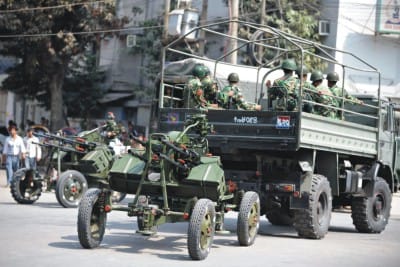So much bloodshed for what?

Photo: AFP
THE BDR rebellion must surely be the ruling coalition's baptism of fire, coming so soon after its assumption of the reins of the government. And just as when the nation was feeling elated, now that an elected government was at last in charge, the mutiny was a rude awakening to the fact that not everything is well in this land of ours.
Reports of what went on inside the BDR headquarters on the morning of Tuesday are still very scanty, and are of little help in making an accurate assessment of the incident. But I shall try and piece together the fractured information and see if we can make a sense of what went wrong. What, however, must be made clear before we proceed any further is that not all the BDR sepoys joined the rebel ranks so far as I can assess, and some perhaps also offered resistance to the rebel group.
This incident, some say, is the outburst of many years of pent up grievances of the BDR jawans. And the major gripe was the command of officers seconded from the army. But one must understand that this was a well-planned and co-ordinated action which the intelligence agencies failed to get the wind of. And the time and space was well selected: the occasion of BDR reunion, a yearly event, and the darbar, where most of its officers would be present.
It is not quite the spontaneous outburst of resentment at not being heard by the DG. In the 35 years of my service in the army, a great portion of which was spent in the company of troops and in operation under very trying conditions I have never heard of or encountered a situation where grievances manifested in the form of violence that we are getting to hear about. No level of grievance can justify the mayhem.
The situation has been tackled in a very pragmatic manner by the government. The government troops were on a very sticky wicket tactically, given the location of the BDR HQ and the other installments inside it, and the heavy conurbations all around it.
It was an extremely judicious approach to adopt the path of least resistance. Knowing when to withhold from precipitate use of force that might risk civilian lives is the hallmark of good planning. But the fact remains that we have a rebellion on our hands. And a large number of officers have been killed.
I would suggest that there is much more than what is made out by the rebel troops justifying their action. No sane persons can indulge in random killings just because their officers refused to hear their grievances.
We have learnt that the rebels started laying down arms from the early morning of Thursday. We have heard, too, that there are many dead, and the state minister for law is on record that the number is near to 50. I suspect that the number of dead might be considerably more than that.
Did it need the lives of so many for the grievances of the BDR troops to be fulfilled? I suggest that there is much more than meets the eye. And those at the helm of the state machinery must comprehend why so many lives were lost just to have the grievances of BDR troops redressed.
There is no doubt that this is also a case of failure of command -- failure to see the shape of things to come, failure to address troops' needs timely. I would also suggest that it has also been a dismal and unpardonable failure of the intelligence agencies that are supposed to keep watch over these elements.
One can guess that there was lax oversight over the BDR command by the appropriate ministries. No doubt the DG's own mechanism failed him, because it must have been neutralised by the rebels well before they went into action.
But the issue is much more than merely invoking the demands of the troops of the paramilitary force. On the face of it, the demand to have the BDR officered by its organic element may sound innocuous, but it has much wider ramifications. And when they had been living with this system for the last 37 years, why mutiny now?
There are operational reasons why army officers go on lien to the BDR. It is an integral part of our battle plan, designed to operate alongside the regular forces and designed for integration in peace-time so that it is easier during the times of need to exercise command. Changes that have been demanded cannot be wrought overnight. And the mutineers must be made to understand that.
The most disconcerting aspect is that at the moment the BDR is without its commanders. The border as far as I am concerned is unattended and the BDR is virtually non-functional. That is something that the government will have to address urgently.
As for the grievances, while they may be genuine, the government must take a long-term view of the matter. All angles must be probed -- because there are reasons to believe that this was not a spontaneous rebellion.
The PM declared amnesty to the rebels and asked them to lay down their arms on Tuesday. Apparently, not all had complied and one could see the resolve in her address to the nation that the government would not hold back from the use of force should the rebels not comply.
However, one would hope that the issue would be resolved without further loss of life. And I for one also believe that the government should not and would not compromise with those that were responsible for the killings.

 For all latest news, follow The Daily Star's Google News channel.
For all latest news, follow The Daily Star's Google News channel. 



Comments